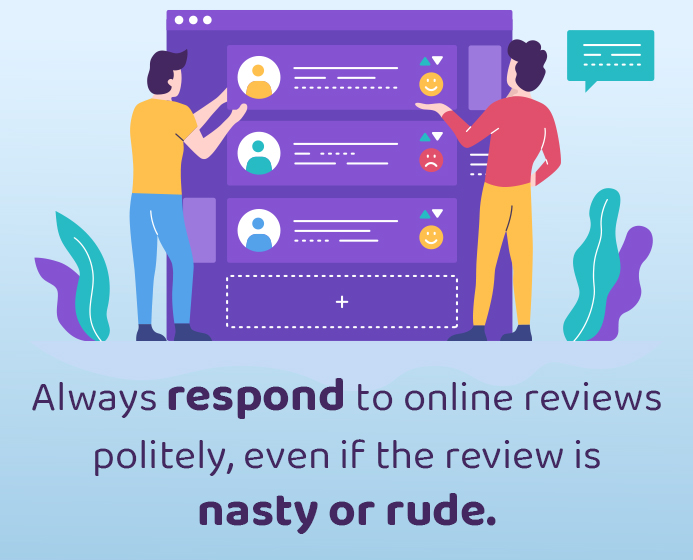Top Online Reputation Management Tips for Dentists
Posted on ,
When it comes to being successful in both offline and digital realms, Practice Builders states that maintaining a strong online reputation is paramount for any dental practice. Patients often rely on online reviews and feedback to make decisions about their healthcare providers, including dentists. A positive online reputation not only attracts new patients but also instills trust and confidence in your current ones. So, how can dental practices effectively manage and improve their online reputation? Let’s delve into some key strategies that can elevate your dental reputation management game and help you stand out in the crowded digital landscape.
Gather patient reviews and feedback
Patient reviews and feedback are crucial for a practice’s online reputation, as 88% of consumers trust them as much as personal recommendations. Try your best to engage satisfied patients to share their positive experiences on platforms like Google My Business, Yelp, and Healthgrades, which can boost credibility and attract new patients. Timely responses to reviews are essential, ideally within 24 to 48 hours, as they show patients that you value their feedback and demonstrate your commitment to excellent customer service.
Addressing negative feedback professionally can help lower or even remove potential damage to your reputation and potentially win back patients. Patient reviews not only showcase your strengths but also provide valuable insights for improvement, allowing you to refine services and enhance the patient experience. Engaging with patient reviews and feedback strengthens your online reputation, fosters trust, and fosters loyalty among your patient community.


Build your presence on different platforms
Diversification is essential for a practice’s online presence in today’s digital landscape. Social media platforms like Facebook, Instagram, and Twitter (X) are powerful tools for connecting with patients, with over 3.5 billion people worldwide using these platforms. Share engaging content, such as oral health tips, behind-the-scenes glimpses, and patient success stories, to attract followers and foster meaningful connections.
Listing your practice on healthcare-specific platforms like Zocdoc, Healthgrades, and Vitals can expand your reach, allowing patients to search for and book appointments with healthcare providers in their area. Being featured on popular platforms or channels can lend credibility and build trust with patients. Tailor your content to each platform’s audience, such as visually stunning photos on Instagram, informative articles on LinkedIn, or interactive polls on Twitter. By diversifying your online presence, you can effectively reach and connect with a broader audience, ultimately boosting your dental reputation management efforts.

Make communication easy and fast
Dental practices must prioritize swift and effortless communication to meet the expectations of patients. Ensuring that contact information is displayed and easily accessible across all online platforms is crucial. Your website and social media profiles should serve as a user-friendly map for patients to reach out to your practice, providing clear contact details such as phone numbers, email addresses, and office hours. Implementing online appointment scheduling and live chat support functionalities on your website can further streamline communication and enhance the patient experience.
With 64% of patients preferring online booking, allowing patients to schedule appointments with just a few clicks reduces the burden on front desk staff. Live chat support can increase website conversion rates by up to 20%. By embracing these communication technologies, dental practices can meet the expectations of tech-savvy patients and strengthen their online reputation as responsive healthcare providers.


Don’t forget to mention your team and staff
Highlighting your team and staff humanizes your practice and fosters a sense of trust and connection with your patients. Introduce your team members on your website and social media platforms, showcasing their qualifications, expertise, and dedication to patient care. Personalizing your practice’s online presence helps differentiate you from competitors and reinforces your commitment to providing exceptional dental care.
Think about investing in local SEO
Local SEO is a crucial strategy in online reputation management for dentists to attract local patients. By optimizing your website and content with relevant keywords and location-based phrases, your practice can stand out in local search results. Incorporating keywords that show your area or connect your practice with a specific region strategically throughout your content improves your chances of appearing in local search results.
Additionally, using schema markup on your website provides structured data about your business, such as your address, phone number, and business hours, making it easier for search engines to display your information in search results. Investing in local SEO can enhance your practice’s visibility and attract more patients.

Become active on social media
Social media platforms like Facebook, Instagram, and Twitter (X) have become crucial for dental reputation management to boost online reputation and connect with patients on a personal level. To effectively use social media, dental practices should share informative and easy-to-read posts related to dental health, such as tips for maintaining a younger smile, regular dental check-ups, and insights about toothpaste or eating habits. Incorporate personality into your social media presence by sharing more information about your practice life, introducing team members, and showcasing patient success stories, so everything looks pleasing to the eye.
Authenticity is key to building trust and rapport with followers. Be quick and build interactions by inviting the audience to become a part of live seminars, Q&A sessions, or different events and giveaways. Maintaining an active presence on social media requires consistency, posting regularly, and at times when your audience is most active. Making use of social media management tools and monitoring performance metrics can help build brand awareness, foster patient loyalty, and attract new patients.
Build partnerships with influencers and learn about trends
Partnering with influencers and staying at the top of industry trends can make your dental reputation management efforts more likely to be successful. Collaborate with local influencers, such as dental bloggers or community leaders, to reach new audiences and gain credibility. Stay informed about emerging trends in dentistry, technology, and patient preferences to position your practice as a forward-thinking industry leader.
Conclusion
In conclusion, effective online reputation management for dentists is essential for practices seeking to not be forgotten in today’s digital landscape. By implementing these proven strategies—focusing on patient reviews, building a diverse online presence, prioritizing communication, showcasing your team, investing in local SEO, leveraging social media, and staying aware of trends—you can enhance your dental practice’s online reputation and attract more patients. Remember, building a positive online reputation is an ongoing process that requires dedication, authenticity, and a patient-centered approach. With the right strategies in place, your dental practice can establish itself as a trusted provider of high-quality care in the digital realm.
Our healthcare digital marketing agency is here to support you on your journey to dental reputation management success. Contact us today to learn more about our comprehensive online reputation management services tailored specifically for dentists.

 Why Good communication Matters in Healthcare
Why Good communication Matters in Healthcare De-Escalation Tips for Handling Aggressive Patient..
De-Escalation Tips for Handling Aggressive Patient.. Reaching The Right Audience Through Target Marketi..
Reaching The Right Audience Through Target Marketi..